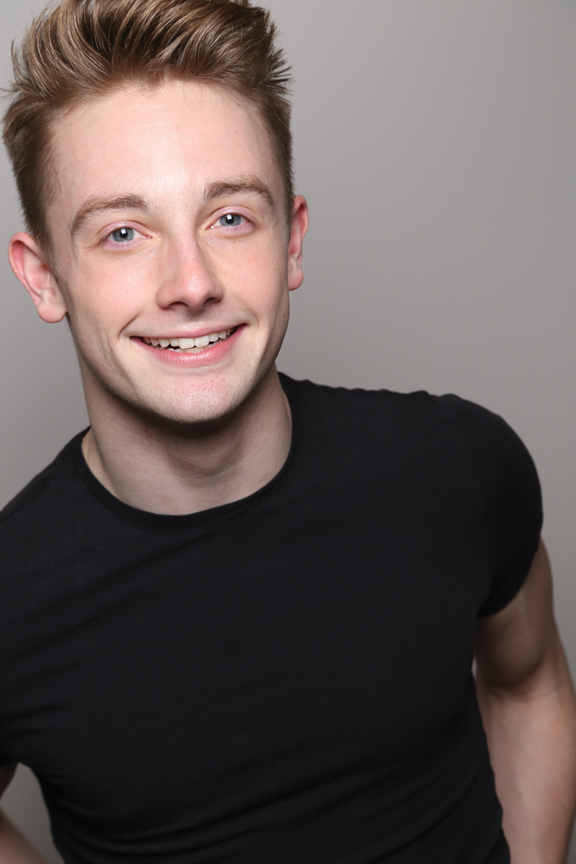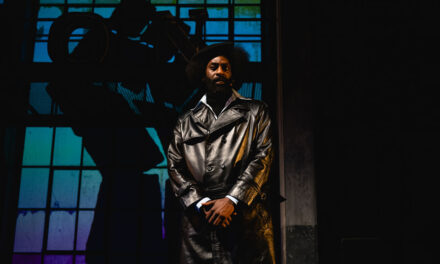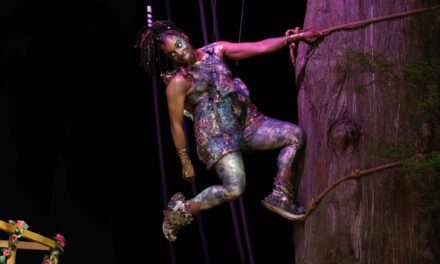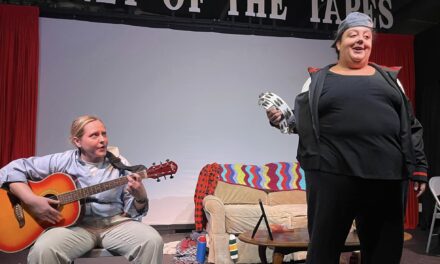“I think the message of love and acceptance—seeing someone for who they are—is one of the most important things that we as Americans can learn right now.”
Interview by Scott Dowd.
Entire contents copyright © 2017 Fearless Designs. All rights reserved.
A dozen years ago, Geoff Deane took the real life story of Northampton shoe factory owner Steve Pateman (renamed Charlie Price) and turned it into a cult classic film. Kinky Boots showed that creativity comes in many forms and that differences in style don’t necessarily indicate differences in values. Less than a decade after the film, this message of inclusion and acceptance inspired a magnificent collaboration between four-time Tony Award-winner Harvey Fierstein and rock icon Cyndi Lauper. The new musical adaptation of Kinky Boots swept through the 2013 Tony Awards, claiming the top awards for Best Musical, Score, Choreography, Orchestrations and Sound. As in the film, Kinky Boots, the musical, takes audiences from a men’s shoe factory in England to the stylish catwalks of Milan. With the factory’s future hanging in the balance, help arrives in the spectacular form of Lola, a fabulous performer in need of some sturdy new stilettos. With Lola came the Angels—a tight-knit group of drag queens who function as a kind of Greek Chorus. Though new to the Kinky Boots tour, Tony d’Alelio is already a veteran road performer. We spoke by telephone as he was preparing to don his six-inch heels for another fabulous show.
Tony d’Alelio: It’s my average day before the show tonight. I woke up, had breakfast, went to the gym, and now I have some down time before work starts.
Scott Dowd: How long ago did you find out you would be a part of the Kinky Boots North American Tour?
TD: I auditioned in New York City in December, and I found out three days before Christmas that I was going to be an Angel in Kinky Boots. That was the best Christmas present ever. I began learning the show in January.
SD: What did you have to do to get ready?
TD: I immediately went in for shoe fittings. It takes a while to make and build the costumes and all the shoes for the show. Those shoes are individually handmade for my feet. I was on the road January 30 to learn the show with the company, and now I have taken over the role.
SD: Where are you from originally?
TD: I grew up in Roanoke, Virginia.
SD: Is your family involved in the arts?
TD: My mother was in musical theatre. I would watch tapes of her performing and run the VHS over and over again while I memorized everyone’s part. Then I would sit my parents down and say, “Okay, today I’m playing this part.”
SD: So your career choice couldn’t have been much of a surprise.
TD: No. I was doing sports and my dad suggested I get into gymnastics. I spent my entire childhood in dance lessons and I went to a performing arts high school.
SD: How old are you now?
TD: I’m twenty-three.
SD: What have you been doing for the past five years since high school?
TD: When I was eighteen, I joined the national touring company of Disney’s Beauty and the Beast as The Carpet. Then I was lucky enough to take over the role of Le Fou, Gaston’s compatriot in that production. I call my education “Beauty and the Beast University” because I learned so much there. I spent a little over two years with that show and that was my entree into professional theatre. I used that experience as my college. I worked with people who had so much more experience than me, and I did everything I could to soak up what they were generous enough to share with me. From there, I did some regional productions and then I joined Actors Equity, the union for professional actors, when I did the national tour of Matilda last year.
SD: So you’re an old hand at being on the road.
TD: Yes, this is my fifth year out here on the road.
SD: Do you have a permanent address?
TD: I have an apartment back in New York City. When I leave town for jobs, I have friends who move in and pay rent.
SD: How much time do you actually get to stay in New York between shows?
TD: Between Kinky Boots and Matilda, I had eight months in New York City. That was great. I did different commercial jobs and took a lot of classes and auditioned. When I got back from Matilda, I had to start all over again auditioning, and Kinky Boots was the one that said yes.
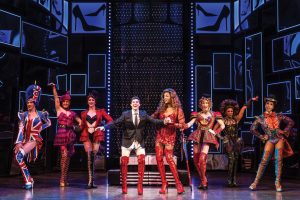
From the National Tour of Kinky Boots.
SD: Do you still have to do the cattle call auditions?
TD: When I was first starting out, I had to wake up at 6 o’clock in the morning to stand in line to be “Number 300.” After Beauty and the Beast, I got an agent, and casting directors know who I am now. So after years of auditioning and working—with the help of my agent—I’m able to schedule my auditions. It is much better than waiting in line all day.
SD: That’s quite a lot to have achieved by the age of twenty-three.
TD: Thank you. I’m very fortunate that my hard work has paid off and I now can reap the benefits of it.
SD: When did you really start preparing yourself for this career?
TD: While gymnastics was a lot of fun, I got distracted and just wound up dancing in the corner. So one of my gymnastics teachers said, “We’ve got to put him in a ballet class.” I went to a very strict ballet school at a very young age and that taught me a lot of discipline. Ballet was really the foundation of my training. In middle and high school, I got into as many shows as I could in the community, at school and at other schools.
SD: Did you take private lessons?
TD: I did have private voice lessons. With dance, I made my best friends in class. They became my family and I grew up with them. We pushed each other until we became working professionals.
SD: So they’re working, too?
TD: Some of my best friends from my hometown have worked for Disney and with different touring companies. One of my closest friends—who always played opposite me in high school—is an agent in New York City. If you put in the work, success will come.
SD: I guess if you’re doing a show called Kinky Boots, getting the costume right has to be paramount.
TD: Absolutely. The costumes are my favorite part of the production.
SD: You are one of “the Angels.” How does your character relate to the story and the other characters on stage?
TD: Our director, Jerry Mitchell, says the Angels are the heart of the show. There are six of us and, in my opinion, we represent archetypes. We have every race, height, size and personality represented on that stage. The best thing about the Angels is that we’re not wallflowers—we are likeable girls. We come to the factory and make friends with all of the factory workers and they really push the story of Kinky Boots by saying, “These men in these big, fabulous costumes can talk to you. They are just like you and have things in common with other men who are making boots in a factory.”
SD: What kind of relationship do the Angels have with the guys in the factory at the beginning of the story?
TD: I like to think of the Angels as the Spice Girls. We’re a really tight group. The first time we meet them, the Angels are in their nightclub. By the end of the show, we’re all dancing with factory workers. In the finale, I have two grown men on either side of me and we’re party dancing together as one family.
SD: Each of the Spice Girls has her own persona. Do the Angels have specific personas as well?
TD: You bet. We are not the Rockettes. Our costumes are designed by Greg Barnes. He really kept our personalities in mind and enhanced our characters with specific looks.
SD: How will we know which Angel is you, Tony?
TD: Well, all of my wigs are red. All of my costumes are pink and red, so I look like a Valentine’s Day card. All of us have our own color scheme. What you bring to the table in the audition is personality. It isn’t set by the show and that’s what’s fun for me. Every time I go on stage, I find out more about her. In every show, she becomes a little more specific.
SD: Had you done drag before this role?
TD: I have. I did a regional production of La Cage aux Folles for eight weeks in Florida. That was the most fun, challenging show I had done to this point. I’m really grateful for that experience, because it was a great preparation for Kinky Boots.
SD: What are you learning from the show?
TD: With this family, I’m learning dedication—dedication to staying healthy and to the message of our show, which is acceptance.
SD: How are audiences receiving this message of acceptance? You’re going to some places where you may find a strong current of social conservatism.
TD: I find that by the end of the finale, every audience is with us. At some point in the show, they decide, “Okay, I’m going to be a part of this.” What’s really amazing about this show is that when audience members come in, they see red sequins and a big, old factory. They can either relate to our lead character, Charlie, a straight white man who has taken over his father’s business or—on the other end of the spectrum—we have Lola, who is a fabulous black drag queen. For the audience to see them meet in the middle as they cross paths on their way to finding out what they have in common puts everyone on their feet at the end of the show. That is amazing every night.
SD: This show was timely when it came out in 2013, but it seems like now it may be even more important.
TD: I agree one hundred percent. I think the message of love and acceptance—seeing someone for who they are—is one of the most important things that we as Americans can learn right now.
SD: How demanding is this show on your stamina? Are you on stage the whole time?
TD: Our score, by Cyndi Lauper, is my favorite that I’ve gotten to sing. I’ve never been in a company with so many incredible vocalists. Everyone sings throughout the show, whether you are on stage or not. We sing off-stage because they want the sound to be as powerful as possible so we sing for two and a half hours!
SD: How difficult is the choreography?
TD: For the Angels, the choreography is designed to be joyous. The entire show is based on something called “The Everyman Step.” The audience shouldn’t look at it and think, “I could never do that.” We want it to be relatable to audience members. The challenge is doing it in platform heels! The Angels are about six inches off the ground. I’m used to seeing the world at five feet, seven inches. Six inches taller is a different animal.
SD: There is another group on stage that we have mentioned already—the factory workers. These are all actors, of course, but casting has been difficult because of the desire to make them appear authentic.
TD: That’s true. A lot of actors in New York do everything they can to look like a model. It can be difficult to find someone who looks like a person you could pass on the street. Our actors in the roles of the factory workers are so smart you believe they really could be working in a factory.
SD: Do they function as Yang to your Yin?
TD: I think so. Being an Angel is a different style of performance, and when I first met these guys, I wasn’t sure how much we would have in common. But after a week of knowing them, I found out they are the same type of person as me. They love making jokes and they are hilarious!
SD: It sounds like you had an experience very similar to that of your character.
TD: Yes, and it reinforced for me the message of acceptance. When you’re playing a drag queen, there is a temptation to assume that other people won’t understand you. But it just takes ten minutes of speaking to someone and looking them in the eye to find the similarities. You just have to start by saying “Hello.”
SD: You still have a long road ahead before you get to Louisville this summer.
TD: We do. But, by the time we get there, my performance will be perfection. I promise. I look forward to sharing this wonderful show with you and the rest of the audience at The Kentucky Center. The show is, above all else, fun and visually exciting, and I know you’ll love it!
Kinky Boots will play The Kentucky Center June 13–18. Performances begin Tuesday evening and continue through Thursday evening at 7:30 p.m., Friday & Saturday evenings at 8 p.m., Saturday matinee at 2 p.m., Sunday matinee at 1 p.m., and Sunday evening at 6:30 p.m. Tickets are available now at The Kentucky Center box office, online at www.KentuckyCenter.org, or by phone at 502-584-7777. Groups of ten or more can
Scott Dowd has a wealth of experience working within and commenting upon the arts scene in Louisville. He has been involved with Kentucky Opera, the Louisville Orchestra, and Louisville Public Media. His talents and experience include: Actor; Director; Singer; Musician; Radio and Television Interviewer; Classical and News Jock; Public Speaking; Public Relations; Marketing; Development; Writer; Substantive Editor. He currently serves on the Board for Arts-Louisville.com.

